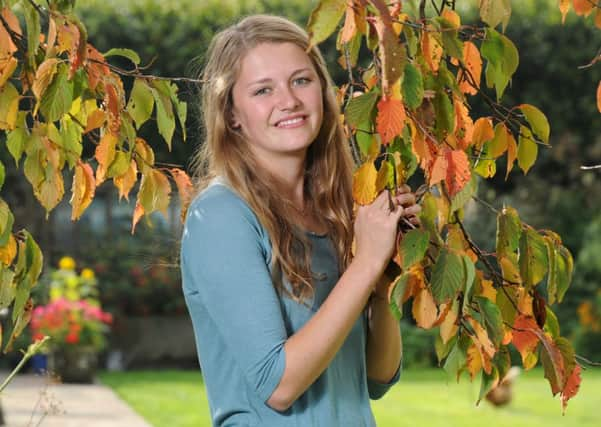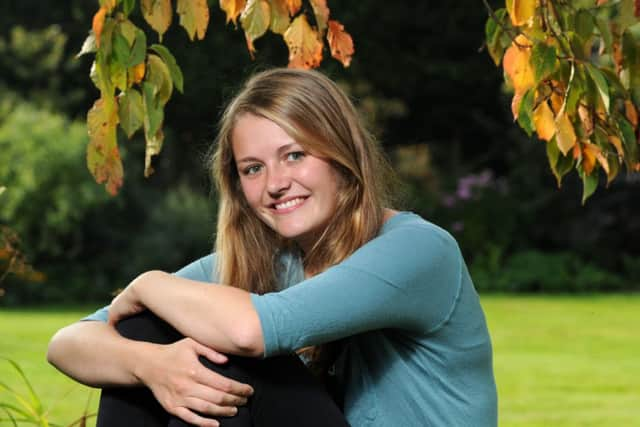The 11th hour heart transplant which saved my life


In three days time Sally Slater will celebrate her 21st birthday. Last weekend she took part in the Great North Run and in a week or so she will leave the family home in Kirkby Malham and head back to Nottingham for her final year at university.
As landmark moments go they’re not particularly unusual, but each holds extra significance for her parents Jon and Bridget because back in March 2000 there were times when they feared she might not survive the month.
Advertisement
Hide AdAdvertisement
Hide AdSally was just six years old when she was struck down by a mystery virus which began to attack her organs. Treated initially in Leeds, as her condition deteriorated, she was transferred to the specialist Freeman Hospital in Newcastle where doctors told the Slaters that the only hope of survival was a new heart.


“When she first became poorly we thought it was just one of those illnesses that would pass,” says Jon, who works as a financial adviser in Leeds. “She was tired and quite listless, but then she suddenly became really poorly. When your child is seriously ill, you go on automatic pilot.
“Looking back to 14 years ago now, it all seems a bit of blur, the days and weeks blur into one another. In order to buy her a bit more time, Sally had been fitted with a plastic heart, but we all knew that if a transplant didn’t become available quite quickly the prognosis was grim.
“When you are waiting for a transplant everything is out of your control and you feel quite powerless. I think that’s partly why when the medical team asked if we wanted to make an appeal to the press we said yes. We were willing to do anything if we thought it might help.”
Advertisement
Hide AdAdvertisement
Hide AdHaving spoken to one journalist, the family imagined that it might result in a small piece in the local paper. In fact the story of Sally was picked up by the national and international press and Jon and Bridget suddenly found they were front page news both here and abroad.
“I think there can’t have been much else happening in the world because the next day I went down to the hospital shop and there was Sally on almost every front page,” says Jon. “I couldn’t believe it.”
In fact there was a lot happening. The controversial Rover sell off rumbled on, John Major had just announced he would quit at the next election and particularly wintry spell of weather had some predicting a white Easter.
However the race to find a heart for Sally and the photograph of her lying on a hospital bed, reliant on a ventilator to breathe and clutching her favourite toy, seemed to strike a chord with the public.
Advertisement
Hide AdAdvertisement
Hide AdJon and Bridget knew that while going public with their own heartache might not necessarily help their own daughter, they did hope it would raise awareness of the acute shortage of suitable organ donors. They never knew how many people were prompted to register after reading their story, but they were comforted by the countless cards containing messages of support which were sent to the hospital ward.
When a week passed with no news, they did fear time was running out, but 10 days after making the appeal Sally was handed a life line - a heart had become available following the death of a 49-year-old woman who had registered as an organ donor some time previously.
At the time, Jon said it felt like they were about to take the first step on a very long ladder and any relief they felt at Sally being matched with a suitable donor was tempered by the knowledge their youngest child would have to undergo a major 10 hour operation and by the end there was no guarantee of success.
“The operation was really just the start of a very long road to recovery, but Sally did amazingly well,” he says. “It was a few months before she was allowed home, but from quite early on she was keen to get back to school and return to the normal life she’d had before.”
Advertisement
Hide AdAdvertisement
Hide AdA week or so after the operation when Sally was taken off the ventilator, the first thing she asked for was a glass of orange juice and the first she did was watch a Mary Poppins video. The old Sally was back, but still very poorly.
Just prior to the transplant operation, Sally had been sedated and her memories of her time in hospital are sketchy and it was a few years before she looked at the newspaper cuttings charting her illness.
“I think the first thing I really remember from that time is having physiotherapy,” she says. “I don’t really remember much from before the operation and it wasn’t really until much later that I realised how serious things had been.
“In some ways it was much worse for mum and dad than it was for me as I was completely out of it.”
Advertisement
Hide AdAdvertisement
Hide AdThree months after being admitted, Sally left hospital and when she returned to school that September the only obvious reminder of her ordeal was a small scar and the twice daily dose of tablets to boost her immune system and prevent her body rejecting her heart.
A year on she had returned to Brownies and spent much of her free time either swimming or horse riding. Today, there is little the transplant means she can’t do.
“I still have to take tablets every day and I go for a check up every three months, so it’s still part of my life, but it’s not one I think about too much,” she says. “I can do pretty much everything I would have been able to had I not been poorly, the only thing I can’t do is travel around South America because if you are crossing from one country to another you need to show you have had the jab for yellow fever.”
She did though go to Peru last year and while her dad says she has always lived life to the full, she remains conscious of just how much she owes to organ donation.
Advertisement
Hide AdAdvertisement
Hide Ad“Perhaps it’s not surprising given what happened to me, but I really do believe that we should have an opt out rather than an opt in system,” she says. “I know there are a huge amount of ethical issues surrounding such a change, but we need to at least talk about it. Whenever I talk about what happened to me, I’m always very aware that while I was incredibly lucky it was only because of another family’s tragedy. There are so many people out there who would want to donate but for whatever reason never sign up or talk to their loved ones about their wishes.”
Jon admits that until his daughter became ill was one of the thousands who kept a donor card in his wallet, but rendered it meaningless by never having officially registered.
What happened to Sally saw dozens of friends and family sign up, but 14 years on the transplant waiting list remains huge and many on it will die before suitable organs become available.
“It would be great if we could change the system,” says Sally. “But sadly I don’t think it will happen in my lifetime.”